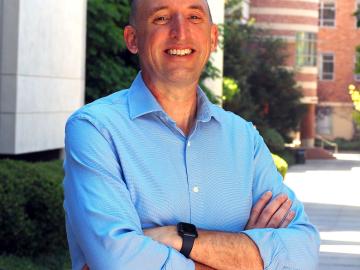
Filter News
Area of Research
- Advanced Manufacturing (1)
- Biology and Environment (13)
- Computational Engineering (1)
- Energy Science (10)
- Fusion and Fission (22)
- Fusion Energy (15)
- Materials (16)
- Materials for Computing (1)
- Mathematics (1)
- National Security (1)
- Neutron Science (4)
- Nuclear Science and Technology (12)
- Supercomputing (22)
News Topics
- (-) Clean Water (33)
- (-) Fusion (66)
- (-) Molten Salt (10)
- (-) Quantum Computing (53)
- 3-D Printing/Advanced Manufacturing (146)
- Advanced Reactors (40)
- Artificial Intelligence (131)
- Big Data (79)
- Bioenergy (112)
- Biology (128)
- Biomedical (73)
- Biotechnology (39)
- Buildings (74)
- Chemical Sciences (86)
- Composites (35)
- Computer Science (226)
- Coronavirus (48)
- Critical Materials (29)
- Cybersecurity (35)
- Education (5)
- Element Discovery (1)
- Emergency (4)
- Energy Storage (114)
- Environment (218)
- Exascale Computing (67)
- Fossil Energy (8)
- Frontier (64)
- Grid (74)
- High-Performance Computing (130)
- Hydropower (12)
- Irradiation (3)
- Isotopes (62)
- ITER (9)
- Machine Learning (68)
- Materials (157)
- Materials Science (158)
- Mathematics (12)
- Mercury (12)
- Microelectronics (4)
- Microscopy (56)
- Nanotechnology (64)
- National Security (86)
- Neutron Science (171)
- Nuclear Energy (122)
- Partnerships (68)
- Physics (69)
- Polymers (35)
- Quantum Science (93)
- Security (31)
- Simulation (65)
- Software (1)
- Space Exploration (26)
- Statistics (4)
- Summit (71)
- Transportation (103)
Media Contacts

The Quantum Computing User Forum welcomed attendees for a dynamic event at ORNL. The annual user meeting brought the cohort together to highlight results and discuss common practices in the development of applications and software for quantum computing systems.

Debjani Singh, a senior scientist at ORNL, leads the HydroSource project, which enhances hydropower research by making water data more accessible and useful. With a background in water resources, data science, and earth science, Singh applies innovative tools like AI to advance research. Her career, shaped by her early exposure to science in India, focuses on bridging research with practical applications.

John joined the MPEX project in 2019 and has served as project manager for several organizations within ORNL.

The award was given in “recognition of his lifelong leadership in fusion technology for plasma fueling systems in magnetically confined fusion systems.”

To better predict long-term flooding risk, scientists at the Department of Energy’s Oak Ridge National Laboratory developed a 3D modeling framework that captures the complex dynamics of water as it flows across the landscape. The framework seeks to provide valuable insights into which communities are most vulnerable as the climate changes, and was developed for a project that’s assessing climate risk and mitigation pathways for an urban area along the Southeast Texas coast.

Researchers conduct largest, most accurate molecular dynamics simulations to date of two million correlated electrons using Frontier, the world’s fastest supercomputer. The simulation, which exceed an exaflop using full double precision, is 1,000 times greater in size and speed than any quantum chemistry simulation of it's kind.

Oak Ridge National Laboratory has named Troy A. Carter director of the Fusion Energy Division in ORNL’s Fusion and Fission Energy and Science Directorate, or FFESD.

A new study conducted on the Frontier supercomputer gave researchers new clues to improving fusion confinement. This research, in collaboration with General Atomics and UC San Diego, uncovered that the interaction between ions and electrons near the tokamak's edge can unexpectedly increase turbulence, challenging previous assumptions about how to optimize plasma confinement for efficient nuclear fusion.

Researchers used quantum simulations to obtain new insights into the nature of neutrinos — the mysterious subatomic particles that abound throughout the universe — and their role in the deaths of massive stars.
Close on the heels of its fourth summer school, the Quantum Science Center, or QSC, hosted its second in-person all-hands meeting in early May. More than 150 scientists, engineers and support staff traveled from 17 institutions to review the QSC’s progress, examine existing priorities and brainstorm new short- and long-term research endeavors.


